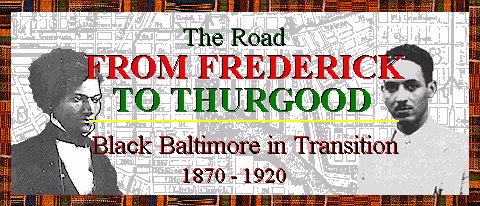 |
John W. Locks:Professional Career |
 |
John W. Locks:Professional Career |
John Locks was an enterprising business man. He began his career as an apprentice, as did many men of his time. His master taught him the trade of "carpenter and joiner," useful skills in a shipbuilding town. John later worked as a caulker in the shipbuilding industry at Fells Point, a profession open to many African Americans in Baltimore. Locks rose through the ranks of skilled artisans and never forgot his co-workers. He took on his own apprentice in the caulking business, and eventually owned the Caulkers' Hall on South Dallas Street, where the union met.
Locks originally labored as a shipbuilder, but later owned and managed a shipyard. He co-founded the Chesapeake Marine Railway and Dry Dock Company. He was the Company's president when it was chartered in 1868. He returned to those duties in the 1870s after a brief hiatus, and served until 1884, when the Dry Dock Company ceased operations.
Like many entrepreneurs, John Locks diversified his economic interests. He owned a prosperous hack company on Wolfe Street, in Fell's Point. Locks' obituary in The Day stated that "he possessed the confidence of the hackmen and undertakers of the city to a remarkable degree, and until incapacitated by sickness was treasurer of the Hackmen's Association, a society composed largely of white men." Locks' involvement in the association shows that he was as concerned with laborers as with management.
Locks' father set a good example of fiscal management for his son to follow. His financial dealings taught John W. the value of prudent investment and banking. The elder Locks bequeathed to his family "about $900 dollars now deposited in the Savings Bank of Baltimore." The Savings Bank was founded in 1818 to provide a safe place for financial investment to the "mechanick, the labourer, the sea faring man, the apprentice, male and female domestick and the industrious poor." John W. Locks opened accounts in his own name between 1845 and 1874. In 1865 the Freedmen's Bureau established the Baltimore branch of the Freedmen's Savings and Trust Company, which aided freed slaves and other African Americans in their quest to attain economic independence. Three years after its opening, John W. deposited funds with that important institution, and Locks' children Joseph, Theodore, and Georgeanna opened their own accounts the following year. Thus, three generations of Lockses planned and saved for the future, and in doing so invested in their community by supporting banks designed to help their class and their race.
Locks' many political connections provided him with business opportunities for his hack company. Many of his partners and clients were African American. For example, Locks formed partnerships with several local black business men, including Samuel Chase and Alexander Hemsley. Chase was a coffin maker, Hemsley was an undertaker, and Locks provided hearses. According to some death certificates, Locks himself served as the undertaker. Together, they provided services indispensible to their community.
Locks rose from being a caulker's apprentice to president of a shipbuilding company, from a laborer to owner of a hack service, and from among slaves to being the leader of a free community.
![]() Return
to "Civil Rights & Politics" Introduction
Return
to "Civil Rights & Politics" Introduction
![]() Return
to The Road From Frederick To Thurgood Introduction
Return
to The Road From Frederick To Thurgood Introduction
|
Tell Us What You Think About the Maryland State Archives Website!
|
© Copyright February 03, 1998 Maryland State Archives